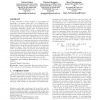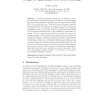551 search results - page 85 / 111 » Semantic knowledge in word completion |
KCAP
2009
ACM
14 years 4 months ago
2009
ACM
Ontologies are conceptual models of particular domains, and domains can be modeled differently, representing different opinions, beliefs or perspectives. In other terms, ontolog...
GECCO
2005
Springer
14 years 3 months ago
2005
Springer
A fuzzy controller is usually designed by formulating the knowledge of a human expert into a set of linguistic variables and fuzzy rules. Among the most successful methods to auto...
CLEIEJ
2004
13 years 10 months ago
2004
A collaborative B2B relationship implies jointly executing business processes. This relationship demands a complete access to available information and knowledge to support decisi...
JELIA
2004
Springer
14 years 3 months ago
2004
Springer
Abstract. Often, decision making involves autonomous agents that are structured in a complex hierarchy, representing e.g. authority. Typically the agents share the same body of kno...
CSL
2001
Springer
14 years 2 months ago
2001
Springer
Abstract. In classical approaches to knowledge representation, reasoners are assumed to derive all the logical consequences of their knowledge base. As a result, reasoning in the �...


